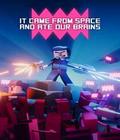While innovation in a game genre is always nice, it isn't necessarily a requirement. Sometimes, performing the basics well is good enough for a player who's looking for a straightforward experience. This is where a game like It Came from Space and Ate Our Brains comes in. The title may be lengthy, but it lays things out as simply as possible and does a good job of making it a pleasant experience.
That simple approach is exemplified in the campaign mode, which doesn't try and sell the player on a story. Instead, you choose your stage, select a difficulty level, and start about killing aliens. Just about every stage has you trekking through alleyways or rooftops or sewers, trying to make it from one safehouse to another. The last leg of your journey sees you demolishing a giant alien egg. Once that's done, you're back to the stage select screen to repeat the process until all six stages have been conquered.
In some ways, It Came from Space has a very Left 4 Dead vibe going on. You can pick any stage you want, but you have to unlock it first. The game is mainly a cooperative experience for up to four players, but unlike the original PC version, this one only does local play with no drop-in co-op, even though people can leave at any time. Unless you're in your safehouse, enemies will spawn in around you, so there's no stop to the shooting. There are also a few different alien types, but they mainly differ in size and melee attack power instead of attack abilities.
Aside from your heroes being nameless and the fact that you're shooting aliens instead of zombies, there are a few differences to note. For starters, you can carry items like a healing pack or a turret that'll last for a while, but the fact that you can only carry one at a time can be frustrating, since you'll never go a few feet without a new item being available that you can't get since you already have something else in hand. You can also run across guns that you'll hold on to for a limited amount of time in a fully powered-up state, whether it's a rocket launcher with a large explosive radius or a plasma rifle that acts like a spread gun. As good as these guns are, they are better served as previews of what a fully powered-up weapon will look like, giving you a better idea of what kind of weapon you want for the excursion. To that end, the game is always giving you a constant supply of cash, and while you can use that to buy every weapon so you can switch between them, you'll most likely stick with one gun and use the funds to upgrade it over time, with the knowledge that you'll repeat the grind when you start a new stage.
It Came from Space doesn't get more complicated than that, which lends itself to being very easy to pick up and play. Aside from the ability to dodge, all you have to do is point and shoot, and while there are multiple paths to take, you'll likely run into areas with more cash or enemies rather than dead ends. Most of the time, your only variance to the moving and shooting are areas where you need to stop to activate a switch and clear out the approaching horde.
Apart from the main campaign mode, the game also features a survival mode, which seems rather typical at first. However, it borrows from the campaign in that you aren't taking on endless hordes of aliens but set numbers of them before the game declares that you've cleared the level. In a way, it is pretty much the campaign mode, minus the constant traveling.
The visual presentation can be best described as simple but striking. The soundtrack is creepy and evokes a feeling of eternal dread, since you can never catch a break from the moving and shooting. Most of the guns sound fine, with the exception of the pistol, which can be quite grating due to the loud and monotonous thumping of bullets; it's motivation to get something more useful. Graphically, the blocky nature evokes the likes of Minecraft without necessarily going into voxel territory, but the uncomplicated design means that the game can fit a ton of characters on-screen simultaneously without slowdown. What stands out the most is the lighting, as most of the game is bathed in darkness, and the only sources of light are from your flashlight and anything neon. That includes the mouths and eyes of the aliens, and the dayglo effect does a great job of ensuring that you always know where an enemy is.
It Came from Space and Ate Our Brains doesn't do anything all that differently from other games of its ilk. It does all of the expected things well enough, so you'll find the experience to be enjoyable either alone or with local friends. While not exactly a top-tier experience, it is recommended if you've gone through the slew of twin-stick heavy hitters the system already has on offer.
Score: 7.0/10
More articles about It Came from Space and Ate Our Brains













 It Came from Space and Ate Our Brains is an arcade top-down shooter. It offers addicting gameplay, four-player co-op mode, and tons of aliens to send into oblivion.
It Came from Space and Ate Our Brains is an arcade top-down shooter. It offers addicting gameplay, four-player co-op mode, and tons of aliens to send into oblivion.




